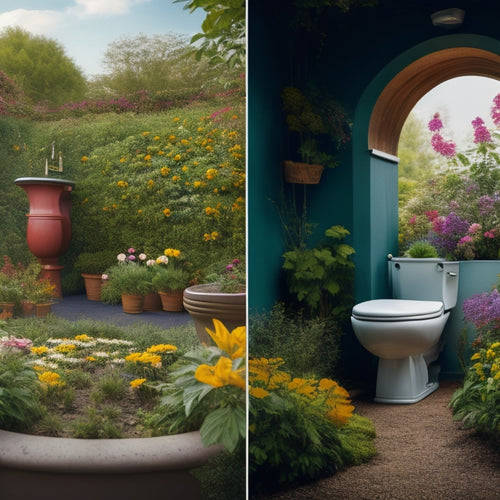
Why Build a Home Rainwater Collection System?
Share
By building a home rainwater collection system, you'll reduce your water bills, alleviate stormwater runoff, and increase your water self-sufficiency. You'll also lower your carbon footprint, protect local water sources, and enhance irrigation of the environment. Additionally, you'll improve water quality standards and future-proof your home for a more sustainable tomorrow. By capturing rainwater, you'll take control of your water usage, saving you money and supporting a greener future. As you investigate the benefits of rainwater collection, you'll uncover even more ways to maximize its potential and reap the rewards of a water-conscious lifestyle.
Key Takeaways
- Building a home rainwater collection system reduces water bills by up to 50% and decreases reliance on municipal water supplies.
- It mitigates stormwater runoff, alleviating burdens on local ecosystems and reducing erosion, flooding, and water pollution.
- Rainwater collection systems provide a steady supply for non-potable uses, increasing water self-sufficiency and control over water usage.
- By using rainwater, you lower your carbon footprint, conserve potable water, and reduce overall demand on energy-intensive municipal water supplies.
- Investing in a rainwater collection system future-proofs your home, ensuring long-term financial savings and environmental sustainability.
Reduce Your Water Bills
By implementing a home rainwater collection system, you can greatly reduce your water bills. This system allows you to harvest and store rainwater for non-potable uses such as flushing toilets, washing clothes, and irrigating your garden.
By using rainwater for these purposes, you can markedly decrease your reliance on municipal water supplies. In addition, using renewable energy sources like solar power to pump and treat the collected rainwater can further reduce your carbon footprint and energy costs.
This, in turn, leads to substantial cost savings and contributes to water conservation efforts. On average, a home rainwater collection system can save you up to 50% on your water bills.
With rising water rates and increasing concerns about water scarcity, investing in a rainwater collection system is a wise decision for homeowners seeking financial freedom and a sustainable future.
Mitigate Stormwater Runoff
Implementing a home rainwater collection system also helps alleviate the burden of stormwater runoff in your community. Stormwater runoff can cause erosion, flooding, and water pollution, which negatively impact local ecosystems.
By collecting and storing rainwater, you reduce the amount of stormwater that flows into nearby waterways, mitigating these issues. Effective stormwater management is essential for maintaining healthy ecosystems, and your home rainwater collection system plays a significant role in this effort.
In addition, incorporating renewable energy solutions, such as solar energy implementation, can further reduce your carbon footprint and contribute to a more sustainable future.
Increase Water Self-Sufficiency
One significant advantage of a home rainwater collection system is that it increases your water self-sufficiency, allowing you to rely less on municipal water supplies. By collecting and storing rainwater, you'll have a steady supply for non-potable uses like watering your lawn, washing your car, and flushing toilets. This reduces your dependence on municipal water, giving you more control over your water usage.
Furthermore, implementing sustainable practices like rainwater harvesting and renewable energy sources for EV charging can further minimize your environmental footprint. As you implement water conservation strategies, you'll also notice a decrease in your water bills.
Additionally, using rainwater for sustainable gardening practices will help you grow healthier plants while minimizing the amount of chemicals and potable water used. By adopting a home rainwater collection system, you're taking a significant step towards water independence.
Lower Your Carbon Footprint
Your home rainwater collection system is a powerful tool for reducing your carbon footprint. By collecting rainwater, you're decreasing your reliance on municipal water supplies, which require significant amounts of energy to treat and transport. This, in turn, reduces your carbon emissions and contributes to a more sustainable lifestyle.
In addition, integrating renewable energy sources, such as solar energy solutions, can enhance your system's efficiency and lower operating costs. Moreover, reducing reliance on fossil fuels can lead to significant carbon reduction and a quieter environment.
Decreases potable water demand: By using rainwater for non-potable purposes, you're conserving potable water for drinking and cooking, reducing the strain on municipal supplies.
Supports sustainable practices: Rainwater collection systems promote eco-friendly habits and encourage individuals to take an active role in reducing their environmental impact.
Protect Local Water Sources
Watersheds, the areas of land that drain water into a common body, are delicate ecosystems that require careful management to maintain their health. You can play a crucial role in protecting these ecosystems by building a home rainwater collection system. By harvesting rainwater, you'll reduce the amount of stormwater runoff that can pollute local water sources. This is especially important in areas with stringent rainwater regulations.
| Community Awareness | Rainwater Regulations | Benefits |
|---|---|---|
| Educate neighbors about the significance of protecting local water sources | Check local ordinances to guarantee compliance | Reduced stormwater pollution |
| Organize community events to promote water conservation | Understand restrictions on rainwater harvesting | Preserved natural habitats |
| Collaborate with local government to develop rainwater-friendly policies | Comply with guidelines for rainwater system installation | Enhanced community image |
Enhance Landscape Irrigation
Make informed plant selection choices, opting for drought-tolerant species that thrive with rainwater.
Implement efficient irrigation techniques, such as drip irrigation or soaker hoses, to minimize evaporation and runoff.
By adopting a green fleet management strategy, you can also reduce your carbon footprint and contribute to a more sustainable future sustainable fuel options.
Create a diverse and resilient environment that requires less maintenance and care.
Improve Water Quality Standards
As you implement efficient irrigation techniques, you're likely to reduce the amount of stormwater runoff that can carry pollutants into nearby waterways. By collecting and utilizing rainwater, you can decrease the amount of chemicals and contaminants that enter local water sources. This not only benefits the environment but also improves water quality standards.
| Parameter | Rainwater | Municipal Water |
|---|---|---|
| pH Level | 6.5-7.5 | 6.5-8.5 |
| Turbidity | 1-5 NTU | 0.1-5 NTU |
| Bacteria Presence | May contain bacteria | Treated to remove bacteria |
| Nitrate Levels | Low to undetectable | 0.5-10 ppm |
| Hardness | Soft water | Hard water |
Regular water testing and proper rainwater filtration can guarantee the collected water meets or exceeds local water quality standards. By taking these measures, you can enjoy the benefits of rainwater collection while maintaining a high level of water quality.
Future-Proof Your Home
Future-proofing your home with a rainwater collection system is a proactive step towards minimizing your environmental footprint and reducing reliance on municipal water supplies.
By investing in a rainwater collection system, you're ensuring a sustainable future for yourself and your family. This system allows you to:
- Harvest and store rainwater for non-potable uses, such as flushing toilets and washing clothes
- Reduce your water bills and dependence on municipal water supplies
- Contribute to water conservation and sustainability practices, aligning with your values of freedom and environmental stewardship
Frequently Asked Questions
Can I Use Rainwater for Drinking and Cooking Purposes?
You can use rainwater for drinking and cooking if you guarantee proper water quality through effective filtration methods, such as UV treatment, reverse osmosis, or activated carbon filters, to remove contaminants and pathogens.
How Often Do I Need to Clean and Maintain the System?
Ah, the sweet taste of independence! You'll want to clean your system every 3-6 months to guarantee ideal water quality. Regular filter maintenance is key, as sediment buildup can compromise your water's purity - so stay on top of it!
Are Rainwater Collection Systems Legal in My Area?
You'll need to research rainwater regulations in your area to determine if collection systems are legal; check with local authorities to obtain necessary permits, ensuring you comply with local laws and avoid potential fines or penalties.
Can I Connect My System to My Existing Plumbing?
You're wondering if you can connect your system to existing plumbing, like the Australians did in Melbourne's 2004 water crisis. Yes, you can, but consider system integration and plumbing considerations, ensuring a seamless connection that meets local building codes and regulations.
Do I Need a Professional to Install the System?
You can opt for a DIY installation, but without skill, you might compromise your system's efficiency and safety, so consider seeking professional advice to guarantee a reliable and compliant setup that meets your local regulations.
Related Posts
-

Why Choose Cool Roofs in Scorching Climates?
You opt for cool roofs in scorching climates because they enable you to reclaim control over your energy consumption ...
-

Why Transform Human Waste Into Garden Gold?
By changing human waste into garden gold, you'll reduce waste management costs, support sustainable agriculture, and ...
-

7 Smart Air Purification Hacks for Energy-Savvy Homes
You can notably improve your indoor air quality while minimizing energy consumption by implementing strategic air pur...


